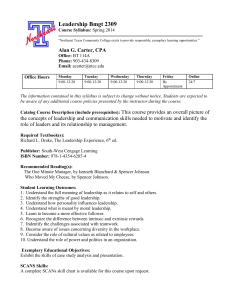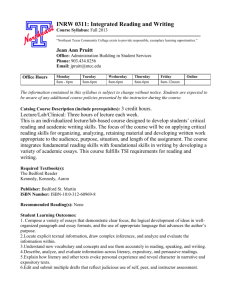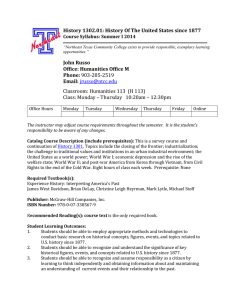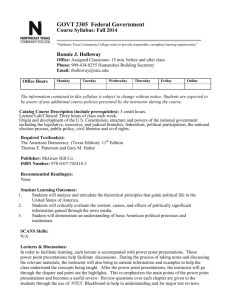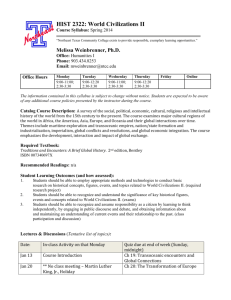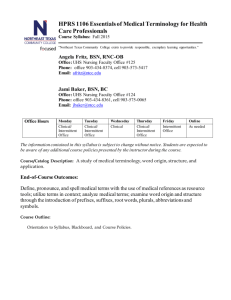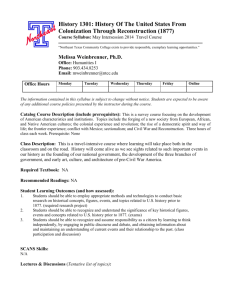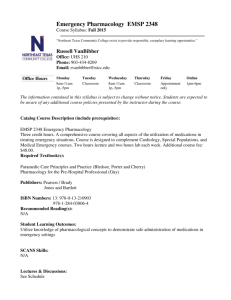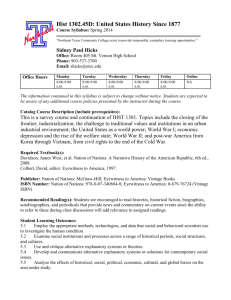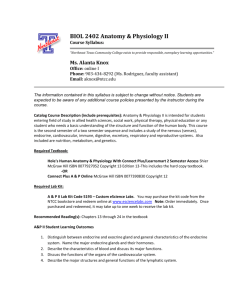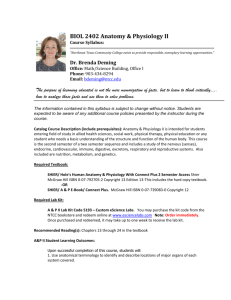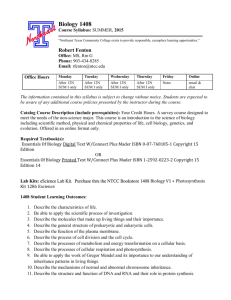History 1301: History Of The United States To 1877
advertisement
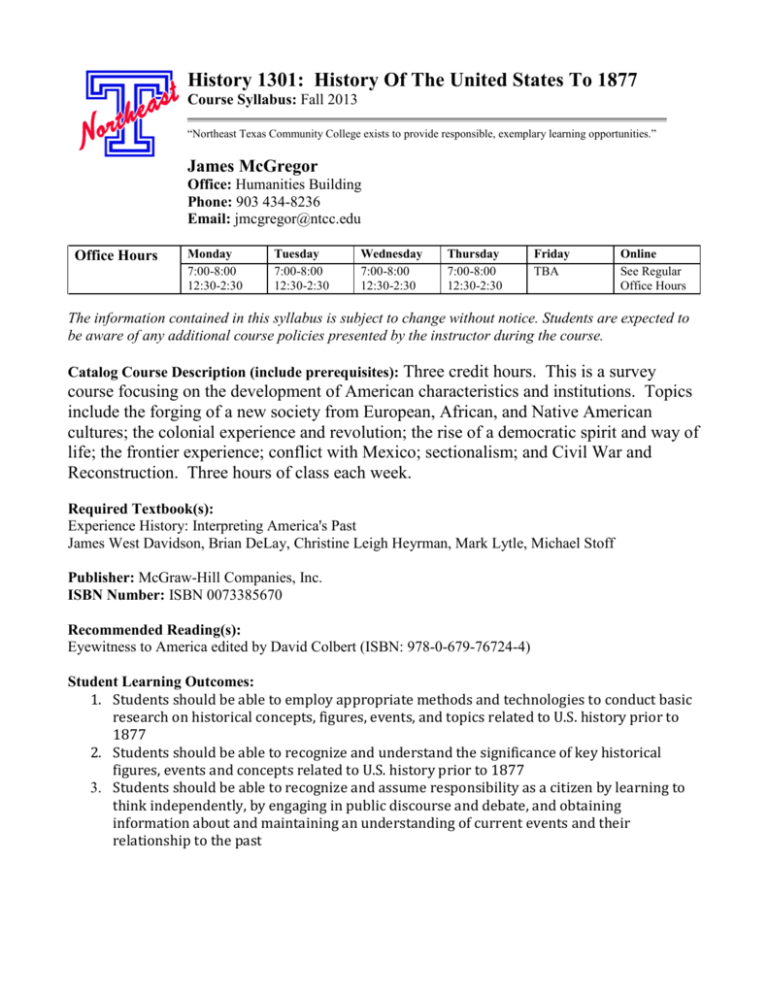
History 1301: History Of The United States To 1877 Course Syllabus: Fall 2013 “Northeast Texas Community College exists to provide responsible, exemplary learning opportunities.” James McGregor Office: Humanities Building Phone: 903 434-8236 Email: jmcgregor@ntcc.edu Office Hours Monday 7:00-8:00 12:30-2:30 Tuesday 7:00-8:00 12:30-2:30 Wednesday 7:00-8:00 12:30-2:30 Thursday 7:00-8:00 12:30-2:30 Friday TBA Online See Regular Office Hours The information contained in this syllabus is subject to change without notice. Students are expected to be aware of any additional course policies presented by the instructor during the course. Catalog Course Description (include prerequisites): Three credit hours. This is a survey course focusing on the development of American characteristics and institutions. Topics include the forging of a new society from European, African, and Native American cultures; the colonial experience and revolution; the rise of a democratic spirit and way of life; the frontier experience; conflict with Mexico; sectionalism; and Civil War and Reconstruction. Three hours of class each week. Required Textbook(s): Experience History: Interpreting America's Past James West Davidson, Brian DeLay, Christine Leigh Heyrman, Mark Lytle, Michael Stoff Publisher: McGraw-Hill Companies, Inc. ISBN Number: ISBN 0073385670 Recommended Reading(s): Eyewitness to America edited by David Colbert (ISBN: 978-0-679-76724-4) Student Learning Outcomes: 1. Students should be able to employ appropriate methods and technologies to conduct basic research on historical concepts, figures, events, and topics related to U.S. history prior to 1877 2. Students should be able to recognize and understand the significance of key historical figures, events and concepts related to U.S. history prior to 1877 3. Students should be able to recognize and assume responsibility as a citizen by learning to think independently, by engaging in public discourse and debate, and obtaining information about and maintaining an understanding of current events and their relationship to the past Exemplary Educational Objectives: 5.1 Employ the appropriate methods, technologies, and data that social scientists use to investigate the human condition 5.2 Examine social institutions and processes across a range of historical periods, social structures, and cultures. 5.3 Use and Critique alternative explanative theories. 5.4 Develop and communicate alternative explanations or solutions for contemporary social issues. 5.5 Analyze the effects of historical, social, political, economic, cultural, and global forces on the area under study. 5.6 Comprehend the origins and evolution of U.S. political systems, with a focus on the growth of political institutions, the Constitution, federalism, civil liberties, and civil and human rights. 5.7 Understand the evolution and current role of the U.S. in the world. 5.8 Differentiate and analyze historical evidence from differing points of view. 5.9 Recognize and apply reasonable criteria for acceptability of historical evidence and social research. 5.10 Analyze, critically assess, and develop creative solutions to public policy problems. 5.11 Recognize and assume one’s responsibility as a citizen in a democratic society by learning to think for oneself, by engaging in public discourse, and by obtaining information through the news media and other appropriate information sources about politics and public policy. 5.12 To identify and understand differences and commonalities within diverse cultures. SCANS Skills: N/A Lectures & Discussions: See Course Description or Blackboard for assignments, course handouts and additional information Evaluation/Grading Policy: 90-100%-A 80-89%-B 70-79%-C 60-69%-D Below 60%-F 2 Exams @ 50% There will be two exams, a mid-term and a final exam. Exams will mainly be multiple choice, but I reserve the right to ask any type of question on any test. Students will need #2 pencils and Scranton answer sheets, which are available in the NTCC Bookstore. If an exam is missed, it is the student’s responsibility to contact me within one class day to set-up a make-up test. Make-up exams are always essay tests. Discussion & Participation @ 10% Students will be given Discussion Questions prior to assigned readings. Students are expected to answer and discuss these questions in depth during class. Written answers for these discussion questions may be required for a grade or chapter quizzes based on these questions may be given. Various other activities may count as part of your participation grade as well Attendance @ 15% Each student is allowed two (2) unexcused absences. Each additional absence will result in a loss of 5 points from their final attendance grade. One class day will be set aside for attendance make-up. Students with more than two absences can receive a 5 point bonus on their attendance grade for attending the make-up session. Students without an absence may receive the bonus as well. Unexcused absences are limited to one (1) in night and summer classes. Attendance make-up classes are not available in night or summer classes. Two (2) tardies will count as one (1) absence. It is the responsibility of students who enter class after roll has been taken to inform the instructor that they were present after class. 1 Biographical Essay @ 25% Reading and writing are imperative to the study of history. Students are required to write one biographical essay based on readings from Eyewitness to America and additional research. A paper copy of the essay must be turned in on the proper due date and the essay must be submitted to SafeAssign. Tests/Exams: See Evaluation/Grading Policy Assignments: See Evaluation/Grading Policy Other Course Requirements: See Blackboard for any assignments, course handouts or additional information Student Responsibilities/Expectations: COURSE EXPECTATIONS 1. Don’t just stop coming to class. Not coming to class without officially withdrawing will result in a failing grade. 2. Regular attendance is vital. If you miss a class, contact one of your classmates for notes, schedule or assignment changes, exam information, etc. 3. This is a college classroom. Proper behavior is expected and required. This includes having respect for others, being on time for class, and maintaining an atmosphere in which all students may learn without interference from others. Standards of behaviors are detailed in the NTCC Student Handbook. 4. Turn off cell phones, alarms, and other devices that unnecessarily cause distractions. Texting in class in not acceptable. If you have an emergency call, then step outside the classroom to answer it so as not to be a distraction. If texting becomes a problem, then offending students will be asked to leave. If the problem continues, offending students will be withdrawn. 5. Cheating and plagiarizing will not be tolerated in any form (For example, cutting and pasting large sections of Internet articles into your essay is plagiarism). Essays must be submitted to SafeAssign to be considered—Essays that are not submitted will receive a zero. 6. Students are expected to complete course work in an honest manner, using their intellects and resources designated as allowable by the course instructor. Students are responsible for addressing questions about allowable resources with the course instructor. NTCC upholds the highest standards of academic integrity. This course will follow the NTCC Academic Honesty policy stated in the Student Handbook. 7. Follow assignment requirements as outlined in this syllabus. Students are responsible for all topics and chapters covered and outlined in the Course Schedule found in this syllabus. 8. Assignment Grades and course information are posted on Blackboard. Students need to regularly to make sure all their assignments have been submitted and graded. check NTCC Academic Honesty Statement: "Students are expected to complete course work in an honest manner, using their intellects and resources designated as allowable by the course instructor. Students are responsible for addressing questions about allowable resources with the course instructor. NTCC upholds the highest standards of academic integrity. This course will follow the NTCC Academic Honesty policy stated in the Student Handbook." Academic Ethics The college expects all students to engage in academic pursuits in a manner that is beyond reproach. Students are expected to maintain complete honesty and integrity in their academic pursuit. Academic dishonesty such as cheating, plagiarism, and collusion is unacceptable and may result in disciplinary action. Refer to the student handbook for more information on this subject. ADA Statement: It is the policy of NTCC to provide reasonable accommodations for qualified individuals who are students with disabilities. This College will adhere to all applicable federal, state, and local laws, regulations, and guidelines with respect to providing reasonable accommodations as required to afford equal educational opportunity. It is the student’s responsibility to arrange an appointment with a College counselor to obtain a Request for Accommodations form. For more information, please refer to the NTCC Catalog or Student Handbook. Family Educational Rights And Privacy Act (Ferpa): The Family Educational Rights and Privacy Act (FERPA) is a federal law that protects the privacy of student education records. The law applies to all schools that receive funds under an applicable program of the U.S. Department of Education. FERPA gives parents certain rights with respect to their children’s educational records. These rights transfer to the student when he or she attends a school beyond the high school level. Students to whom the rights have transferred are considered “eligible students.” In essence, a parent has no legal right to obtain information concerning the child’s college records without the written consent of the student. In compliance with FERPA, information classified as “directory information” may be released to the general public without the written consent of the student unless the student makes a request in writing. Directory information is defined as: the student’s name, permanent address and/or local address, telephone listing, dates of attendance, most recent previous education institution attended, other information including major, field of study, degrees, awards received, and participation in officially recognized activities/sports.
